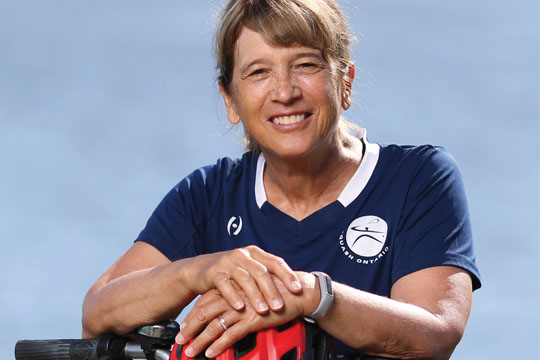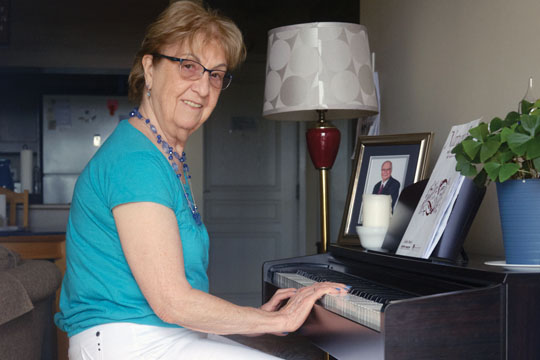
Joanne Merrett, an athletic trainer, says most of her older clients kept up with their fitness by walking, biking and doing online classes.
Lorraine Tétreault’s community is on the squash court. A masters athlete who competes internationally, the Ottawa woman normally spends part of every day at the gym training and practising, and plays in leagues several nights a week. It’s a tight-knit group and one she looks forward to socializing with, particularly since the former chemist retired from the federal government.
The last time she hit a ball was March 14. Overnight, everything shut down, taking her social network with it.
“I remember telling my husband ‘I feel alone’,” says Tétreault, who was also cut off from her adult children.
“The gym is like another neighbourhood for me, so I felt empty as my whole routine changed from one day to the next. I’ve been able to do some training at home as far as conditioning, but it’s not the same. It’s my social hour and suddenly it was gone. I miss my squash friends.”
Instead of the court, the Federal Retirees member now takes to Zoom every two weeks to socialize with them, and occasionally cycles over to her coach’s house to visit from a distance.
“It’s a connection still,” Tétreault says. “But besides that, it’s been really hard.”
Samir Sinha, director of geriatrics at Toronto’s Sinai Health System, says COVID-19 has been quite challenging for many older Canadians, particularly those who have outlived their family and friends, and have a smaller, more dispersed social network. They’re reliant on people beyond that for support and company. And while that can be a lifeline, it may not be the same kind of robust social network they had in their earlier years.
On top of that, “older Canadians are in the line of fire,” given that they have the greatest likelihood of dying if they contract the virus.
“So they’re told to self-isolate and others are told to stay away to protect them, so that exacerbates these tenuous sorts of relationships that people had, where they would rely on others for social support to help them meet their basic needs,” he says. “These are the things that can render people more isolated during a pandemic. It creates extra layers and makes the person who was already feeling socially isolated feel that much worse. How do you stay independent when you’re worried those supports might kill you?”
Up until now, Sinha says social isolation has been a nebulous concept that people knew about, but perhaps didn’t fully understand how deadly it can be. But being robbed of physical contact takes a real mental toll.
“We know loneliness is the equivalent of smoking 15 cigarettes a day,” he says. “It can increase your risk of dying by 45 per cent. That’s partly because social isolation can lead to feelings of loneliness and depression. Humans are social creatures. We crave the company and support of others. I think a majority of us have started to get a sense of how painful and distressing isolation and loneliness can be.”
Months into isolation, Sinha says he’s had patients tell him that the phone and video chats just aren’t cutting it anymore. They want to touch and feel another human being.
Mildred McAfee can relate. Prior to what she has dubbed her COVID-19 “confinement,” she was never one to sit still — or stay at home — for long.
Her son, who visited her weekly at her private seniors’ residence in Lasalle, Que., would often joke about having her social secretary fit him in.
If he wasn’t at her apartment, she was driving to see him in Long Sault, Ont., or taking the train to see her daughter in Pickering, or on an outing in Montreal. She regularly entertained other residents, playing the piano in the grand hall for hours in the evenings, and she met friends twice a week for a game of bridge.
When the pandemic locked down her residence, McAfee, a retired nurse and member of Federal Retirees, says she just found new ways to stay busy. She started the day with exercises and napped every afternoon. She did crossword puzzles and cooked three meals a day, the last of which she washed down with a glass of wine.
Mildred McAfee figures she fared better than many during the COVID-19 lockdowns. She made sure she established a new routine, exercised, played bridge online and stayed in touch with other seniors by phone.
It wasn’t until her daughter reminded her that it had been months since she had touched someone that McAfee felt the weight of her new reality. She made sure she FaceTimed with her children and grandchildren regularly, and took full advantage of the books and classic movies available through a library app.
“I have to tell you when she said that, it gave me a big downer. And I’m not a down person,” she says. It did not stop the peppy senior in her tracks for long, however.
“There are other ways to cope. I made a point to play my own piano an hour a day. It was my therapy last year when my husband was sick. When I play I’m kind of in a bubble. I think that’s what kept me sane.”
As for bridge, instead of meeting her friends across the table twice a week, McAfee’s taken her game online.
“This afternoon my bridge partner came from Turkey. The opposition was from Bulgaria and the U.S. We chit chat as we play. It’s fantastic.” She also channelled some of her energy into calling 16 other isolated seniors in her residence. She didn’t know any of them, but three times a week, she rang them up to chat and to see if they needed help with anything.
“They would look forward to my calls. I don’t know what it is to be depressed, but I know some people are and it’s hard,” McAfee says. “I think I fared better than a lot of people. I didn’t find the confinement all that bad. But it was because I put an effort into it. You’ve got to have some kind of a routine and a plan. Otherwise, you just sit there in front of the TV.”
Establishing a new routine
Pivoting into a new routine seems to be key to making the best of a strange new normal. Among her older clients who regularly attended exercise classes at a local community centre, Ottawa fitness trainer Joanne Merrett has seen many do just that.
“The women there were very close-knit, they were all in the same community,” Merrett says. “A lot of them are walking, biking, golfing and also doing online classes. Most of them have kept up with their fitness because they didn’t want to give it up. It’s not just for physical health, it’s their mental health as well.”
Merrett says the positive side of the pandemic is that people are getting outside more instead of sitting at home.
“Once we get through this I think we’ll see a new normal of what fitness is for seniors,” she says. “We’ll see more getting pro-active because they now know that being healthy and fit is going to be in their favour if they do get COVID-19.”
While Merrett has started outdoor boot camps for Ottawa’s UpRise Fit gym clients who want to meet in person, she’s found older adults are less keen on those.
“It’s hard to get them out to do physical classes because of the heat and they’re not confident about being in close proximity, even if they’re physical distancing.” As for Tétreault, while sidelined from squash, she’s taken up weekly walks in the neighbourhood with her daughter and longdistancen cycling with her son, which get her heart rate up on a regular basis.
“He’s found something that he really likes to do with mom, then he pays for lunch, so even better,” says Tétreault, who had just returned from a 27-kilometre ride. Sinha says while some seniors have locked themselves in their homes out of fear, it’s ultimately in their best interest to get out and interact.
“Overall, seniors are going to be negatively impacted by the physical and mental effects of social isolation, loneliness and depression,” he says. “I think people have a greater risk of dying from the effects of being socially isolated, lonely or depressed than they do from COVID-19. More Canadians will succumb to that than to COVID-19 overall.”
One of the best things people can do for their mental health is to take good care of their physical health. And while some activities have been curtailed, there are still many other options.
“The World Health Organization points to physical activity as being one of the best investments, the best bang for one’s buck in the sense that it’s free, anyone across the age spectrum can take part in it,” says Mark Beauchamp, a professor of exercise and health psychology at the University of British Columbia.
“He’s very computer-savvy,” says his daughter, Helen Searle. “There aren’t too many 102-year-olds who can get on a computer and type as fast as he can. His two fingers fly across the keyboard.”
In recent months, he has connected with a second cousin, who is a judge in Ontario, and together, they have been researching their family tree online.
“We have a great deal in common, including the law,” says Searle, a former Mountie who lives in Halifax. “She’s a very intelligent person, so it’s been good communicating with her. She’s helped me a great deal.”
While he’s keen to get out more into the community now that restrictions are starting to lift, visiting old colleagues in the province and gathering with friends on Facebook’s RCMP Mates page and the RCMP veterans’ association for chats over beers, he says his online connections have been a “godsend.
“When I get up, at least I’m not looking towards a [boring] day.”
There’s clear evidence that points to physical activity’s utility in buffering against stress, as well as mild and moderate depression.
For Kelly McKeown, the godsend came in the form of art. She’d never taken an art course in her life, but her sister-in-law convinced her to sign up for online classes. After ordering some canvases from Michaels, their brushes got busy with up to 100 others at times.
“I’ve never painted before, but I’ve really been enjoying [the classes],” the Mississauga woman says with a laugh. “We’ve been averaging one painting a week. Now my mom wants to take my art and hang it in her house.”
The social organizer among her circle of friends, McKeown, a Federal Retirees member who is still working at the Canada Revenue Agency after 32 years, was out all the time pre-COVID, so being forced to stay at home was initially stressful.
“Painting has definitely been good for my mental health,” she says. “It gives me fewer things to worry about on the outside. Even with my friends, I was always worrying about seeing them. Now I’m just worrying about me.”
As for McAfee, once the lockdown lifted at her residence in June, she wasted no time hitting the road. For her first trip, she spent hours driving around the West Island and people-watching. For her second, she drove to Long Sault to surprise her son.
“It’s a form of therapy as well,” she says. “I just roll the windows down and go.”
Holly Lake is an award-winning journalist from Newfoundland and Labrador, based in Ottawa. She has a master’s degree in journalism from Western University and is currently studying law at the University of Ottawa.


